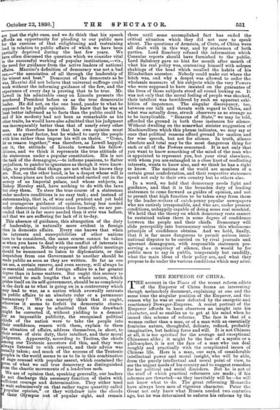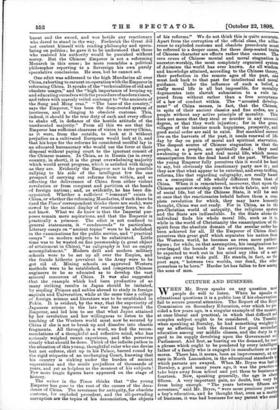THE EMPEROR OF CHINA. T HE account in the Times of
the recent reform edicts of the Emperor of China forms an interesting though melancholy document, explaining at one and the same time the singular position of the Emperor, and the reason why he was at once defeated by the energetic and reactionary Dowager-Empress. A recent portrait of the Emperor affords to keen observers an insight into his character, and so enables us to get at his mind when he issued this scheme of reforms. The face is that of a woman rather than a man, or of a man with an essentially feminine nature, thoughtful, delicate, refined, probably imaginative, but lacking force and will. It is not Chinese at all, it is too spirituel for the average and exceptional Chinaman alike ; it might be the face of a mystic or a philosopher, it is not the face of a man who can deal roughly and practically with the complicated issues of Chinese life. Here is a man, one says, of considerable intellectual power and moral insight, who will be able, from the purely intellectual and moral point of view, to see the urgent needs of his country and to suggest remedies for her political and social disorders. But he is not of the stuff of which practical reformers are made ; if his schemes are thwarted—as they inevitably will be—he will not know what to do. The great reforming Monarchs have always been men of vigorous character. Peter the Great not only knew what Russia needed two centuries ago, but he was determined to enforce his reforms by the knout and the sword, and woe betide any reactionary who dared to stand in the way. Frederick the Great did not content himself with reading philosophy and specu- lating on politics ; he gave it to be understood that those who resisted his authority would be punished without mercy. But the Chinese Emperor is not a reforming Monarch in this sense ; he more resembles a political philosopher reporting to a Sovereign his own purely speculative conclusions. He sees, but he cannot act.
One edict was addressed to the high Mandarins all over China, exhorting to earnest co-operation with the Emperor in reforming China. It speaks of the "technicalities of old and obsolete usages," and the "high importance of keeping up and educating ourselves with the proced ure of modern times," and refers with scarcely veiled contempt to "the ancients of the Sung and Ming eras." "The bane of the country," says the Emperor, "has been the deep-rooted system of inertness, and a clinging to obsolete customs. This, indeed, it should be the true duty of each and every officer to shake off, in defiance of the hostile attitude of the uneducated majority." From all this we see that the Emperor has sufficient clearness of vision to survey China, as it were, from the outside, to look at it without prejudice as a cultivated European would look at it, and that his hope for the reforms be considered needful lay in an educated bureaucracy who would use the force at their disposal without paying court to the ignorant conceit of the Chinese masses. In China, as in Russia (as in every country, in short), it is the great overwhelming majority -which would arrest progress, which is satisfied with things as they are. Evidently the Emperor saw in the possible Tallying to his side of the intelligent few the one prospect of carrying out reforms from within, and so effecting the deliverance of China from either violent revolution or from conquest and partition at the hands .of foreign nations ; and, as evidently, he has been dis- appointed. 'Whether a sufficient "remnant" exists in China, or whether the reforming Mandarins, if such there be ,(and the Times' correspondent thinks there are such), were cowed by the instant display of reactionary force, we do not know. What we do know is that the Imperial pur- poses remain mere aspirations, and that the Emperor is practically a prisoner. The edict is not confined to general statements, it " condescends " to particulars. Literary essays on "ancient topics" were to be abolished iii the examinations for the public service, and "practical essays" on modern subjects to be substituted. Little time was to be wasted on fine penmanship (a great object -of attainment in China), "as caligraphy is but an empty accomplishment." Modern drill and modern military schools were to be set up all over the Empire, and the frauds hitherto prevalent in the Army were to be got rid of. Mining schools on approved Western methods were to be established, and competent Chinese engineers to be so educated as to develop the vast mineral resources of China. It was also suggested -that the example which had been productive of so many striking results in Japan should be imitated, by sending Princes and nobles abroad to study in foreign ,eapitals and Universities, while at the same time a college of foreign science and literature was to be established in Pekin. It is evident, by the way, that the superiority of .Japanese science in the late war has impressed the Emperor, and led him to see that what Japan attained by her revolution and her willingness to listen to the teaching of the Western world must now be secured by China if she is not to break up and dissolve into chaotic fragments. All through, in a word, we find the recom- mendations of a thoughtful and reflective mind, who has seriously weighed recent experience, and who perceives clearly what should be done. Think of the infinite pathos in the situation of this young, thoughtful ruler who can devise but not enforce, shut up in his Palace, barred round by the rigid etiquette of an unchanging Court, knowing that his country is sinking under the burden of ancient superstition and the senile prejudices of thousands of years, and yet as helpless as the meanest of his subjects ! Few more tragic figures have appeared on the stage of history.
The writer in the Times thinks that "the young Emperor has gone to the root of the causes of the deca- dence of China. The reverence for antiquity, for obsolete customs, for exploded precedent, and the all-pervading corruption are the topics of his denunciation, the objects of his reforms." We do not think this is quite accurate, Apart from the corruption of the official class, the adhe- rence to exploded customs and obsolete precedents must be referred to a deeper cause, for these deep-seated traits of Chinese character are effects rather than causes. The vera eausa of Chinese mental and moral stagnation is ancestor-worship, the most completely organised system of Animism the world has ever known. As all wisdom and knowledge attained, according to the Chinese theory, their perfection in the remote ages of the past, one must look back to that past for intellectual and moral guidance. Under the influence of such a belief, a really moral life is all but impossible, for morality degenerates into slavish submission to a rule in. posed from without rather than a free acceptance of a law of conduct within. The "arrested develop. ment " of China means, in fact, that the Chinese, in spite of their ancient classics and fine codes, are a people without any active principle of morality. This does not mean that they steal or murder in any unusual degree, or that they work injustice ; for in the green villages of the interior much happiness, prosperity, and good social order are said to exist. But mankind cannot live on the harvests of the past, it needs renewal of life day by day on pain of moral and spiritual starvation. The deepest source of Chinese stagnation is that the people, as a people, are spiritually dead ; they need awakening to a new and real moral life, which means emancipation from the dead hand of the past. Whether the young Emperor fully perceives this it would be hard to say, but obviously the reactionary party saw it ; and they saw that what appear to be external, and even trifling, reforms, like that regarding caligraphy, are really based on a conception of life wholly different from that of China. When it is remembered, moreover, that upon the Chinese ancestor-worship rests the whole fabric, not only of social life, but of the Chinese State, it will be seen at once that the reactionaries beheld before them a comrn plete revolution for which, they may have honestly thought, China was not ready. For in China, as in the pre-Christian world of antiquity, the religious system and the State are indissoluble. In the State alone the individual finds his whole moral life, such as it is, while in the world of Christianity the emancipation of the spirit from the absolute domain of the seaular order has been achieved for all. If the Emperor of China dimly perceives this great gulf which separates his nation from the Western world, he becomes an even more pathetic figure ; for while, on that assumption, his imagination has over-leaped the bounds of his environment, he cannot be expected to work out in his mind any idea of a safe bridge over that wide gulf. He stands, in fact, as the poet says, " between two worlds, one dead, the other powerless to be born." Harder lot has fallen to few among the sons of men.











































 Previous page
Previous page